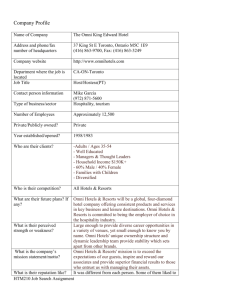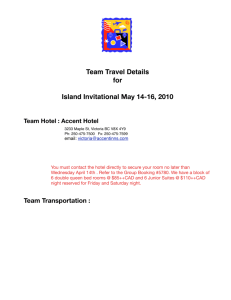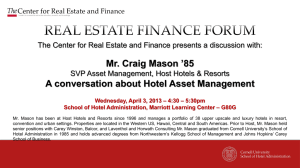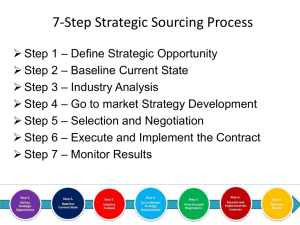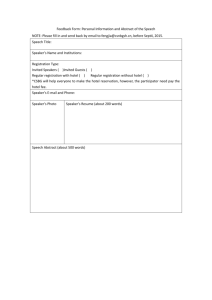Property Report: - The Wall Street Journal
advertisement
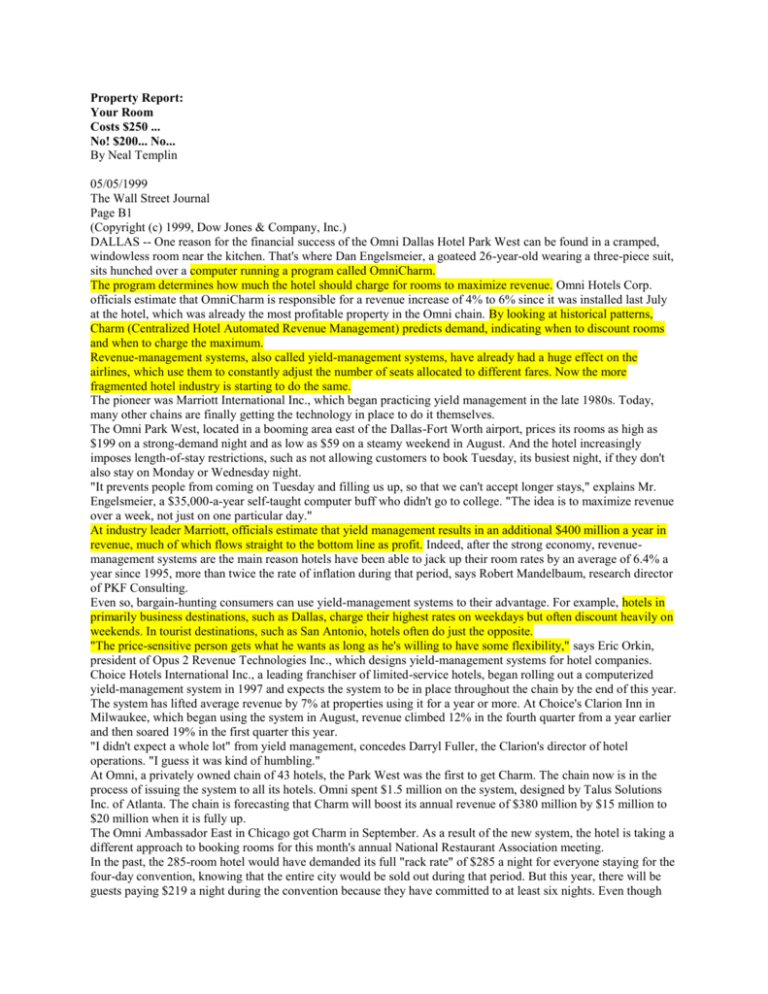
Property Report: Your Room Costs $250 ... No! $200... No... By Neal Templin 05/05/1999 The Wall Street Journal Page B1 (Copyright (c) 1999, Dow Jones & Company, Inc.) DALLAS -- One reason for the financial success of the Omni Dallas Hotel Park West can be found in a cramped, windowless room near the kitchen. That's where Dan Engelsmeier, a goateed 26-year-old wearing a three-piece suit, sits hunched over a computer running a program called OmniCharm. The program determines how much the hotel should charge for rooms to maximize revenue. Omni Hotels Corp. officials estimate that OmniCharm is responsible for a revenue increase of 4% to 6% since it was installed last July at the hotel, which was already the most profitable property in the Omni chain. By looking at historical patterns, Charm (Centralized Hotel Automated Revenue Management) predicts demand, indicating when to discount rooms and when to charge the maximum. Revenue-management systems, also called yield-management systems, have already had a huge effect on the airlines, which use them to constantly adjust the number of seats allocated to different fares. Now the more fragmented hotel industry is starting to do the same. The pioneer was Marriott International Inc., which began practicing yield management in the late 1980s. Today, many other chains are finally getting the technology in place to do it themselves. The Omni Park West, located in a booming area east of the Dallas-Fort Worth airport, prices its rooms as high as $199 on a strong-demand night and as low as $59 on a steamy weekend in August. And the hotel increasingly imposes length-of-stay restrictions, such as not allowing customers to book Tuesday, its busiest night, if they don't also stay on Monday or Wednesday night. "It prevents people from coming on Tuesday and filling us up, so that we can't accept longer stays," explains Mr. Engelsmeier, a $35,000-a-year self-taught computer buff who didn't go to college. "The idea is to maximize revenue over a week, not just on one particular day." At industry leader Marriott, officials estimate that yield management results in an additional $400 million a year in revenue, much of which flows straight to the bottom line as profit. Indeed, after the strong economy, revenuemanagement systems are the main reason hotels have been able to jack up their room rates by an average of 6.4% a year since 1995, more than twice the rate of inflation during that period, says Robert Mandelbaum, research director of PKF Consulting. Even so, bargain-hunting consumers can use yield-management systems to their advantage. For example, hotels in primarily business destinations, such as Dallas, charge their highest rates on weekdays but often discount heavily on weekends. In tourist destinations, such as San Antonio, hotels often do just the opposite. "The price-sensitive person gets what he wants as long as he's willing to have some flexibility," says Eric Orkin, president of Opus 2 Revenue Technologies Inc., which designs yield-management systems for hotel companies. Choice Hotels International Inc., a leading franchiser of limited-service hotels, began rolling out a computerized yield-management system in 1997 and expects the system to be in place throughout the chain by the end of this year. The system has lifted average revenue by 7% at properties using it for a year or more. At Choice's Clarion Inn in Milwaukee, which began using the system in August, revenue climbed 12% in the fourth quarter from a year earlier and then soared 19% in the first quarter this year. "I didn't expect a whole lot" from yield management, concedes Darryl Fuller, the Clarion's director of hotel operations. "I guess it was kind of humbling." At Omni, a privately owned chain of 43 hotels, the Park West was the first to get Charm. The chain now is in the process of issuing the system to all its hotels. Omni spent $1.5 million on the system, designed by Talus Solutions Inc. of Atlanta. The chain is forecasting that Charm will boost its annual revenue of $380 million by $15 million to $20 million when it is fully up. The Omni Ambassador East in Chicago got Charm in September. As a result of the new system, the hotel is taking a different approach to booking rooms for this month's annual National Restaurant Association meeting. In the past, the 285-room hotel would have demanded its full "rack rate" of $285 a night for everyone staying for the four-day convention, knowing that the entire city would be sold out during that period. But this year, there will be guests paying $219 a night during the convention because they have committed to at least six nights. Even though rates are cheaper, the hotel will receive $1,314 in total revenue from the six-night guests, compared with $1,140 for the four-night guests. At the Dallas Omni, Mr. Engelsmeier fires up Charm each morning and begins scanning the availability calendar for the next two months. Dates when the 337-room hotel expects to be completely booked are shaded red. Dates shaded yellow indicate a predicted occupancy rate of 80% or more. Green dates are when the hotel expects to have plenty of available space and will be using aggressive discounting. And dates are colored blue when Charm alters a previous prediction. The program performs more than 100,000 calculations in each hotel every night. "First, I'm going to attack the blue dates," Mr. Engelsmeier said on a recent morning. In each of the five blue dates on his calendar, he found that Charm had a good reason for its changes. On one date, for example, a flurry of reservations obviated discounts Charm had previously recommended. In the hotel's weekly revenue-management meeting that day, top managers questioned Charm's recommendations. General Manager Mohamed Elmougy wondered whether the system was being too aggressive during a period in which it recommended charging the very highest rate of $199 a night to customers seeking to stay between two and four nights. "I would keep an eye on it," Mr. Elmougy told Mr. Engelsmeier, who used to set rates based on his own analysis in the pre-Charm days. Mr. Elmougy professes to be a big believer in Charm but says the system will sometimes make decisions based on historical factors that no longer hold true. So he still relies on Mr. Engelsmeier's intuition and experience. "That's where Dan has job security," Mr. Elmougy says.

